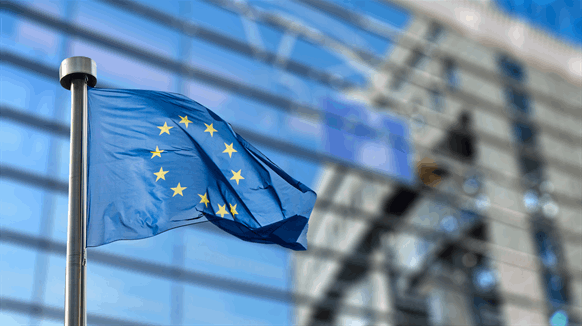The European Parliament approved tougher emissions regulations on industry and a climate support fund for households on Tuesday as part of efforts to reduce the Union region’s greenhouse gas (GHG) emissions European by 55% by 2030.
EU lawmakers voted to adopt reforms to the Emissions Trading System (ETS), a cross-border carbon price adjustment mechanism and a transition assistance fund for households and micro-enterprises , all agreed by the governments of the 27-member bloc last year.
The updated ETS, passed by 413 in favor, 167 against and 57 abstentions, orders companies that emit global warming gases to cut emissions by 62 percent over this decade from 2005 levels, a point percentage more than the previous proposal of the European Commission. .
The reforms are also phasing out zero-cost emission allowances, or permitted GHG emissions for businesses. Under the cap-and-trade system, the EU sells emission allowances that companies can trade, but also makes free allocations. With a target of completion by 2034, the phasing out of free subsidies begins with a 2.5 percent reduction in 2026.
The total suspension of free allowances for the aviation industry comes earlier in 2026, as decided in a separate vote with 463 yes, 117 no and 64 abstentions.
The ETS changes also include the maritime sector for the first time, in an extension approved with 500 votes in favour, 131 in favor and 11 abstentions.
The sectors already covered by the ETS are aviation businesses; electricity and heat suppliers; energy-intensive factories such as those that process metals, petroleum, organic chemicals and paper; companies that release nitrous oxide through the production of adipic, glyoxylic and nitric acids, as well as glyoxal; and aluminum manufacturers emitting perfluorocarbons.
The EU Parliament also agreed to create a separate ETS II for fuel used by vehicles and buildings.
The so-called Carbon Border Adjustment Mechanism (CBAM) has been adopted with 487 in favor, 81 against and 75 abstentions. “It aims to incentivize non-EU countries to increase their climate ambition and ensure that EU and global climate efforts are not undermined by the offshoring of EU production to countries with less ambitious policies,” he said Parliament in a press release.
The CBAM applies to the import of aluminium, cement, electricity, fertilisers, hydrogen, iron and steel. Effective in 2026, it also covers “indirect emissions under certain conditions,” the announcement said.
“Importers of these goods would have to pay any price difference between the carbon price paid in the country of production and the price of carbon rights in the EU ETS,” he said.
EU lawmakers also gave the green light to the formation of a Social Climate Fund (SCF) in 2026 by a vote of 521 to 75 with 43 abstentions. “Vulnerable households, micro-enterprises and transport users who are particularly affected by energy and transport poverty will benefit from this,” the announcement said.
“When fully operational, the SCF will be financed by the auction of ETS II rights up to an amount of €65 billion. [$71.28 billion]with an additional 25% covered with national resources (for an estimated total of 86,700 million euros)”.
The texts of the new policies now go to the European Council for approval. They enter into force 20 days after publication in the Official Journal of the EU.
To contact the author, please send an email jov.onsat@gmail.com


